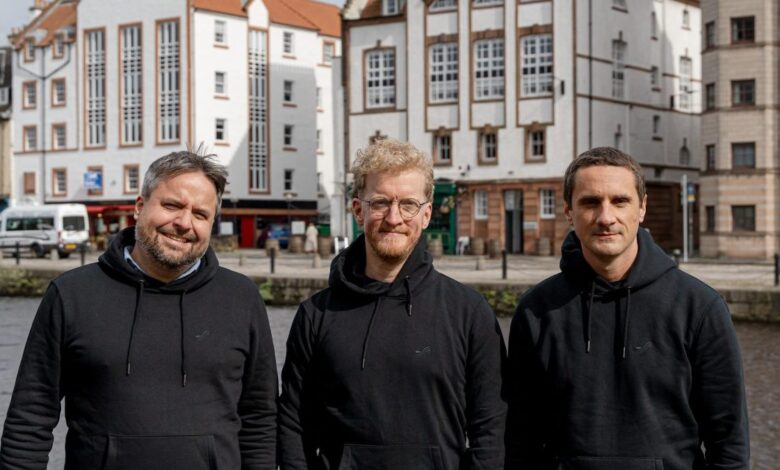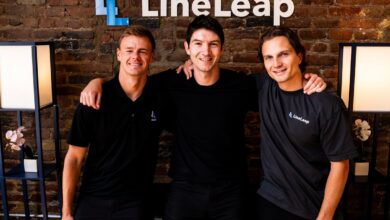‘Lawyer-in-the-loop’ startup Wordsmith wants to bring AI paralegals to all employees

Wordsmith, a fledgling Scottish legal tech startup, has somehow managed to attract the backing of two well-known venture capital firms. The startup targets in-house legal teams and law firms with an AI platform that they can configure to help other workers in the company. This way, anyone in the company can solicit help with legal tasks such as reviewing contracts and answering specific questions about a document.
Incorporated in October last year, the Edinburgh-based company is the handiwork of former senior TravelPerk executives Ross McNairn (CEO) and Robbie Falkenthal (COO), alongside CTO Volodymyr Giginiak, who served in various engineering roles at Microsoft, Facebook, and Instagram. Six months after leaving their previous positions, Wordsmith already claims notable customers, such as Trustpilot, while it’s partnering with at least one major law firm — DLA Piper.
This early traction has garnered the attention of global VC firm Index Ventures, which has led a $5 million seed investment into Wordsmith alongside General Catalyst and Gareth Williams, founder and former CEO of Scottish tech unicorn Skyscanner.
That such a young Scottish startup has secured the backing of two VC firms that have collectively invested in the likes of Facebook, Slack, Sonos, Airbnb, Stripe, and Snap, speaks not only to Wordsmith’s early promise, but also the founders’ pedigrees. Prior to TravelPerk, McNairn founded a travel management startup called Dorsai Travel. He sold it to Skyscanner just nine months after launch and became Skyscanner’s head of product. He then joined another unicorn, second-hand shopping app LetGo, before landing at TravelPerk.
On top of this, McNairn is also a qualified lawyer, a profession he left after a couple of years to become a software engineer.
Legally fond
The legal tech space is hot. In the past six months alone we’ve seen several “co-pilot for lawyers” emerge, such as Harvey AI in the U.S. and Luminance in the U.K. Other legal tech startups, such as Definely and Lawhive in the U.K., have raised decent seed and Series A rounds, as have Alexi (Canada) and Leya AI (Sweden).
These companies are tackling the legal sector from various angles and regional focal points, but they have one thing in common: they’re all riding the generative AI wave.
As with other paperwork-heavy sectors, legal eagles are seeking ways to automate repetitive, labor-intensive work, so that they can focus on more strategic tasks. This is where Wordsmith enters the fray, providing what it calls a “lawyer-in-the-loop” generative AI platform.
While Harvey AI is targeting lawyers themselves, Wordsmith is aimed more at employees within a company, with legal teams configuring the platform behind the scenes by connecting it to all their own data sources. Lawyers remain available when needed.
McNairn draws comparisons to something like TravelPerk, which gives SMEs a self-serve business travel management platform that allows managers to define the policies and approval processes. Employees do all their own bookings within those parameters.
“At TravelPerk one of the big steps [we made] was that we went from trying to speed up the travel team by selling them slightly better tooling, to basically enabling the rest of the business to self-book,” McNairn told TechCrunch. “And then the travel team just administrated, checked, and made sure that it was calibrated correctly. And that shift of building tools just for the function, instead to building tools for the rest of the business to work more effectively, is a huge change in how you work.”
Companies can configure Wordsmith in two core ways: as an autopilot for simpler matters that don’t need expert oversight, and as a co-pilot whereby a lawyer is always in the loop to give their seal of approval before any formal responses are provided.
A typical workflow might involve someone in sales needing to scrutinize a new contract, or perhaps procurement trying to close a deal and who needs access to information such as the company’s security posture — the kinds of questions that are fairly standard and where the responses aren’t likely to change much. By querying Wordsmith, anyone can get the necessary information.

Other potential use cases might include someone issuing a company with a subject access request (SAR), whereby businesses in certain jurisdictions are legally obliged to honor requests related to personal data access. In this instance, Wordsmith could be configured to accept a submission and connect to a company’s ticketing system, and respond either with the requested information, or with a template response outlining timescales and the next steps — whatever a company’s internal guidelines and processes dictate.
Model behavior
Wordsmith uses a combination of foundational large language models (LLMs), including OpenAI’s GPT-4 and Anthropic’s Claude.
“We use the right one for the job,” McNairn said. “Some are really good at analyzing things like logic within legal agreements, and some are really good at being extremely precise on helping us to change language. Claude is very good at rationalising through problems, and OpenAI (GPT-4) is just all round fantastic, with different dimensions.”
Enterprises have shown a little trepidation at embracing generative AI, which McNairn said the company is addressing in different ways. This includes allowing companies to stipulate that their data doesn’t leave the EU. It also promises not to train its AI on companies’ data. Wordsmith configures a “private instance” for enterprises, meaning it connects in to data wherever it is (e.g. Google Drive or Notion) to improve a response using a company’s own data, but this data isn’t used to train the model for other companies.
“We use a technique called RAG (retrieval augmented generation),” McNairn said. “So we’re not training on their data — we’re just using it when it’s necessary. We recall it, use it to enrich the answer, and then give them a response.”
High frequency
While enhancing in-house legal teams will be Wordsmith’s core goal initially, the company is also looking to work with law firms, as evidenced by its early tie-up with DLA Piper. In this instance, DLA — a global billion-dollar legal powerhouse — is co-developing AI agents in partnership with Wordsmith, with a view toward distributing this to its own customers.
So in effect, they are inputting their own technical knowledge to improve Wordsmith for very specific legal domains. It could become something that they can sell on as new type of legal service, presumably at a lower rate.
“It’s higher frequency and lower cost to engage with firms’ knowledge in this way, rather than paying thousands of dollars an hour,” McNairn said. “It’s [also] a much better way to show they are progressive and looking to adopt AI.”
This business model could work particularly well for small-to-midsize law firms, where Wordsmith could be engaged to capture bigger jobs or take on more clients.
McNairns says that while this offering is still in its early design stages with DLA, Wordsmith will likely commercialize this soon. “It’s just not there yet,” he said.
With $5 million in the bank, McNairn says that Wordsmith will now accelerate its hiring both in Scotland and the U.S. The company counts nine employees today, and while some are based in London and/or in the process of moving up, McNairn says he’s keen to make Edinburgh the company’s center of gravity.
“It’s the ecosystem thing I’m quite passionate about,” he said. “There have been three unicorns that I’ve been part of before this, and I just want to build something cool in Scotland.”
Source link



